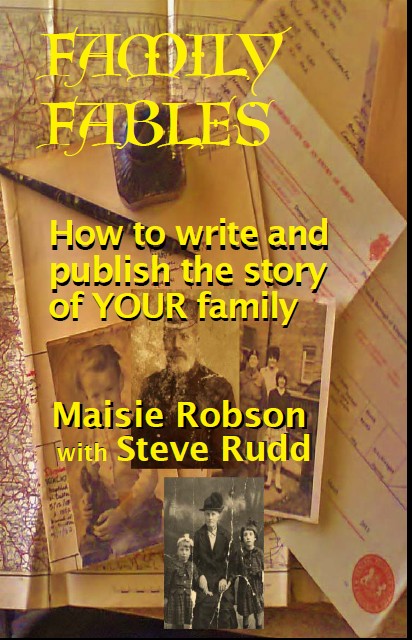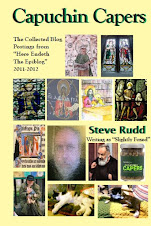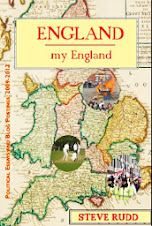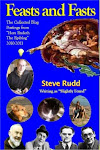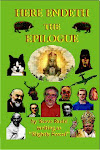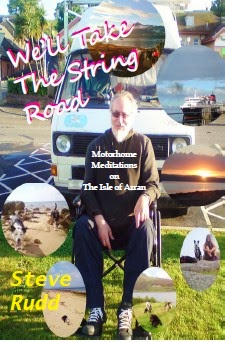It has been a busy week in the Holme Valley. The weather continues much the same, with dull days and occasional bits and bats of rain, although it’s stayed reasonably warm. The leaves are starting to turn, however, and of course this week we had the equinox as well, so we’re now on the ever-darkening road to Christmas.
Matilda’s been making the most of what sunshine there is,
although she never strays far from the decking, presumably because the wood is
warm and retains the heat. She’s also taken to sleeping on the settee in
Colin’s front room, yet another shift of location (she seems to swop around
where she sleeps every couple of months or so). Anyway, this has at least
enabled Misty to reclaim the disputed dog-bed, which she did on the first
opportunity.
I sometimes wonder what’s going on in Misty’s little furry
brain. She was dithering about on the decking the other day, and I wanted to
make sure that she went down into the garden to do her stuff, so I picked up
one of the “fat balls” that we put out for the birds, and lobbed it over the
fence. It landed down by the pond, and I was hoping that Misty would go down
and investigate it, being a collie and therefore more interested in balls than
the average dog. She did, in fact, go
down and investigate it: not only that, but she picked it up in her mouth and
carried it around the garden for a while. Then she dug a hole for it next to
the pond, and buried it. Strange, strange dog.
Zak and Ellie have been around for a couple of days while
Granny’s been otherwise occupied, so Zak got the “benefit” if that’s the right
word, of two separate 11-mile walks with Misty and Deb. He was certainly hungry
when he got back. Ellie didn’t go
because she’s not too well. Also, she does have a habit of setting off on her
own at a tangent. She’s been back to the vet this week because of a potential
allergy problem with the stitches from her biopsy, so we’ll have to see how she
gets on.
I sometimes wonder what’s going on in Debbie’s little furry brain
as well. This week, while the garage had the camper van, they lent her a car.
Having the unaccustomed luxury of a bonnet (the car, not Debbie) she parked up
at one of her peripatetic venues and, while she was locking up, she dumped all
of the paperwork, personal assessments, lesson plans etc in a pile on the said
bonnet. One small but effective gust of wind later, and she was picking them
out of the hedge for the next 45 minutes.
Actually, I shouldn’t crow. Something similar once happened
to me, with a box containing an entire financial year’s receipts, which I was
taking to the accountants. In my case, the gust of wind was not small but
effective, it was a full blown blast of a gale, which scattered them like the
autumnal leaves that strew the brooks in Vallambrosa, half way down the street.
It was just about dawn on a cold November morning, and it had been raining
overnight, so most of them landed in puddles. I spent the next three hours
picking up each last one. I phoned the accountants to tell them there was a
problem, and I would have to re-appoint the meeting. Fortunately, on that
occasion, my friend Maisie, out of the great goodness of her heart, not only
straightened them all out, but actually ironed them, to get rid of the
rainwater. By this means, most of them were saved. She returned them with a
note that said “Here are the receipts. I never want to see them again.” So I
guess Debbie got off quite lightly, although some of the lesson plans might
have been a bit grubby. Other than that, she has been busy foraging, in what is
laughingly described by Kirklees
College as her spare
time, and brought back another two poisonous specimens this week. No, I didn’t put them in the stir-fry.
Although there have been occasions when I felt like it. This week has been even
worse than last, in many ways. Thank God I’ve been too busy to notice, most of
the time.
The bitterness and resentment on all sides over the result
of the Scottish referendum continues. The internet is full of disgruntled yes
voters, whose complaints focus on the vote being rigged, the media being
biased, the banks being against them, and the “scaremongering” which apparently
“cowed” the no voters. I found myself
trying to examine these assertions as dispassionately as I could, given the
fact that I thought the version of “independence” on offer to Scotland was a
disaster waiting to happen, for the reasons I have often enumerated in previous
blogs.
The vote was fixed: could this really have been done? Like
the 9/11 conspiracy theories, for it to be correct, it would have required a
level of country-wide organisation which would also have involved dozens of
people being “in the know” – and as for the video of the teller supposedly
putting yes votes on the no file, presumably since this woman and the count at
which she was working can be identified, why not make an official complaint to
the Electoral Commission or whoever is supposed to oversee these things? So
far, the only “official” complaint seems to have come from Russia, a
country where thieves once broke into the Kremlin and stole next year’s
election results.
The media was biased: this complaint seems mainly to rest on
the fact that the yes voters objected to Nick Robinson’s line of questioning in
the new-famous press conference where he tried (in vain) to pin Alex Salmond
down on the issue of corporation tax. If you ask me, and I have absolutely no
brief for Robinson, Salmond was lucky to have such an easy ride from the media
during a campaign where he answered very few questions.
Which leads me on to “scaremongering”: there would have been one easy way for the yes campaign to
have neutralised "scaremongering" - they could just have come up with
some credible answers to the quite legitimate fears and concerns on which it
was based. The fact that they could not, or chose not to, was their undoing, if
you ask me.
I can only assume that they could not because the necessary detail was lacking on several crucial issues and/or the yes voters were simply told to say, well, we'll worry about the detail after we've won, and that didn't wash with the more canny, risk-averse no voters.
I can only assume that they could not because the necessary detail was lacking on several crucial issues and/or the yes voters were simply told to say, well, we'll worry about the detail after we've won, and that didn't wash with the more canny, risk-averse no voters.
The banks were against the yes voters: the banks are not
“for” or “against” anyone, other than themselves. Same for the big companies.
They looked at the SNP’s economic plans, they came to the conclusion that they
didn’t add up, and they voted with their wallets. As they always do, and as
they always will.
Part of the injustice that the yes voters feel seems to also
rest on the idea that Scotland
always gets a government it didn’t vote for. Whilever Scotland is part of the UK, it gets the government the UK, of which it is a part, votes
for. The fact that Scotland (or some parts of its political
establishment) regards itself as a country is irrelevant in UK electoral
terms. Across the UK,
up to 49% of people could get the government they didn’t want. If you want an
SNP government, then send SNP MPs to Westminster
which some people are finally waking up to as a solution.
Having said that, I have said
some pretty hard things about Alex Salmond over the years, but at least he had
the courage and integrity to resign in the wake of the defeat. Some of the
scumbag politicians we've had in the UK parliament, who have clung on
until their grubby fingernails were prised off the cliff one by one could well
do to take a lesson from that.
But, in the meantime, the rancour
goes on. It will only get worse, as well, if Cameron is allowed to get away
with ratting on his pre-referendum promises to the Scottish electorate. But
right now, the atmosphere is pretty poisonous, with people posting things on
social media sites like:
The No-voters are a poorer calibre of human being than the Yes-voters. The
very fact they allowed fear to rule them instead of hope in the possibility of
change. Anti-Scottish spite was all over some of the comment-sections of the
newspapers. It made me ask myself just where all this bile came from.
As a heady mixture of assumption,
stereotyping, and irony, you’d have to look a long way for a better
example. It is possible, of course, that
people voted “no” out of a very genuine concern for Scotland’s future, so I
wouldn’t be too quick to label them as a sub-species – sometimes it requires a certain amount of
courage to stand up and be the only lemming who says hang on, shouldn’t we
re-think this whole cliff thing. But it hasn’t stopped people posting “I am
proud of my yes voting friends in a way I could never be proud of those who
voted no.” It’s all very sad. I have
actually wondered myself whether we really should be going on holiday next year
to a country where 45% of the people will be harbouring some sort of brooding
resentment against us, and I’m probably not alone in this.
I don’t blame the Scots for
feeling betrayed by Cameron, though, as it is becoming more and more obvious
that he is going to try and weasel out of the additional commitments he
promised. I’m sorry to go on about him
so much. I realise this started out as a blog on spiritual matters, so feel
free to either skip the next bit or treat it as a homily on the problem of evil
and the impossibility of forgiveness. At least he had to suffer the chagrin
this week of being castigated for giving away the details of his private
conversation with the Queen when he phoned her to tell her the referendum
results. My own theory is that, rather
than purring down the phone at him, she was snoring. Either that, or she’d
already hung up and he was listening to the dialling tone.
It would be funny if it wasn’t
such a manifestation of malevolent intent, but this week also saw the carefully-orchestrated
decision to pledge UK
support for air-strikes against ISIL.
Not only was the recall of parliament and the debate deliberately timed
to spike the guns of the UKIP conference, but the previous evening also saw the
arrest and detention of several of the “usual suspects” under the pretext of
“preventing” “terrorism”. The fact is that the Junta could have arrested Anjem
Choudary at any time, and with a similar result: that they would have to release
him again, because, although he is a fundamentalist wingnut of the first order
who is never happier than when he’s winding up some innocent young kid to strap
on a suicide vest, he’s also very careful always to do it within the law, which
is why he hasn’t been nailed many times before. It was done (along with the
other arrests) on Thursday night purely to add to the climate of fear. In the same way as, once the vote had been
announced in Parliament, Boris Johnson urged Londoners to be “vigilant” on the
tube. If Boris Johnson advised me to be vigilant the first thing I'd check
would be to see if his hand was in my pocket stealing my wallet.
I watched/listened to the ISIL
parliamentary debate online on Hansard TV, while I was working. When you
look at this appalling set of grotesque old waxworks in person, you find
yourself wondering "Jesus Christ, is this really the best and most able
635 people in the country?" I think it was
George Bernard Shaw who said that if the scenes from inside an abattoir were
broadcast, people would become vegetarian overnight; I think if watching
broadcasts of parliament was made compulsory, there's be a revolution tomorrow.
As far as the rights and wrongs
of us bombing ISIS are concerned, I could produce a masterly summary of what is
wrong with it, going back and quoting things I have written previously,
starting with condemning the first Iraq war in 2002. But I don’t
think, in all honesty, I could do better than Aubrey Bailey, of Fleet,
Hampshire, who summed up the whole stinking mess in one pithy letter to, of all
people The Daily Mail.
Are you confused by what is going on in the Middle
East? Let me explain. We support the Iraqui government in the
fight against Islamic State. We don’t like IS, but IS is supported by Saudi Arabia,
whom we do like. We don’t like President
Assad in Syria.
We support he fight against him, but not IS, which is also fighting against
him. We don’t like Iran, but Iran supports the Iraqui government
against IS. So, some of our friends support our enemies and some of our enemies
are our friends, and some of our enemies are fighting against our other
enemies, whom we want to lose, but we don’t want our enemies who are fighting
our enemies to win. If the people we want to defeat are defeated, they might be
replaced by people we like even less. And all this was started by our invading
a country to drive out terrorists who weren’t actually there until we went in
to drive them out. Do you understand now?
Well said, Aubrey Bailey. I’d go on further to say that I never
realised that our smart bombs were so smart that they could detect, from 30,000
feet, an ISIL/ISIS terrorist raping a tribeswoman victim, and blow him to
smithereens while leaving her unharmed. Of course, this only applies if he’s on
the wrong side of the Syrian border. If he drags her a few yards into Syria and then
has his evil way with her, we won’t do a thing about it. (As it currently
stands, anyway, although the vote gave Cameron the option to take further
action as he thinks fit, without necessarily having to come back to parliament
for another mandate, so what’s the betting that in six months time, Cameron, or
Boris Johnson, or Nigel Farage, or whoever’s prime minister, will be on our
screens saying that regrettably we had no option but to commit ground troops
and our thoughts are with the families of the casualties, who have been
informed. Better dust off those flags in Wootton Bassett.)
This is the rub, though. What to
do about the abuses of the ISIL/ISIS/whatever they are calling themselves this
week who are massacring and oppressing Christians in the area. (See, I said I would get back to religion
eventually, and I have already
mentioned Jesus, albeit slightly out of context.) To provide the necessary cordon sanitaire, I can’t see any way other than deploying ground
troops. But the question is whose ground troops? Again, I could have a stab at
answering this myself, but it would take a lot of ink and paper, and it would
also contain a detailed and parallel argument for the draining of the swamp of
anti-Muslim sentiment at home and abroad. When you’re in a Wadi, stop digging.
But perhaps the argument is better illustrated by a section of the actual ISIL
debate from Hansard (I have removed the line and column index inserts, because
they break up the flow. If you want the original it’s online on their web
site.) George Galloway may be a controversial figure, but I can’t really argue
with most of what he says here.
George Galloway
(Bradford West) (Respect): Mr Speaker, time does not permit me to tell you how
many millions of times “I told you so” is currently being said in the
country—or will be once people read of this debate. Millions of ordinary people
knew what the expensive talent governing our country did not know, namely that
there was no al-Qaeda in Iraq and that there was no Islamist fundamentalism in
Iraq before Mr Blair—and his mouthpieces who are still here—and Mr Bush invaded
and occupied the country. What a tangled web we have woven is abundantly clear
to everyone watching this debate. The mission creep has not even waited for the
end of the debate. The words on the motion are about bombing Iraq, but there is a consensus in here that we
will soon be bombing Syria.
The words do not mention boots on the ground, but there is a consensus here
that there will be boots on the ground, the only question being whose boots
they will be.
The debate has been
characterised by Members of Parliament moving around imaginary armies. The Free
Syrian Army is a fiction that has been in the receipt of hundreds of millions
of dollars and hundreds of tonnes of weapons, virtually all of which were taken
from them by al-Qaeda, which has now mutated into ISIL. The Iraqi army is the
most expensively trained and most modernly equipped army in history. Hundreds
of billions of dollars have been spent on the Iraqi army, which ran away
leaving its equipment behind. ISIL itself is an imaginary army. A former
Defence Secretary no less said that we must bomb its bases. It does not have
any bases. The territory that its personnel control is the size of Britain and yet
there are only between 10,000 and 20,000 of them. Do the maths. They do not
concentrate as an army. They do not live in bases. The only way that a force of
that size could successfully hold the territory that it holds is if the
population acts as the water in which it swims. The population is quiescent
because of western policies and western invasion and occupation. That is the truth of the matter. ISIL could not survive
for five minutes if the tribes in the west of Iraq rose up against it.
Ian Austin (Dudley North) (Lab): Does the
hon. Gentleman understand how appalled people will be to hear him say that
women who have been buried alive or enslaved have been quiescent in their
persecution by these people? What a total disgrace.
George Galloway: They don’t like it up them,
Mr Speaker. They would rather have an imaginary debate, moving around imaginary
armies. ISIL is a death cult. It is a gang of terrorist murderers. It is not an
army and is certainly not an army that will be destroyed by aerial bombardment.
ISIL is able to rule the parts of Iraq that it does because nobody in those
parts has any confidence in the Government in Baghdad, a sectarian Government
helped into power by Bremer and the deliberate sectarianisation of Iraqi
politics by the occupation authorities. The Government know that. That was why
they pushed al-Maliki out—even though he won the election, by the way, if we
are talking about democracy. They pushed him out because they knew that far too
many people in ISIL-occupied Iraq
had no confidence in the Baghdad
Government. Nobody has any confidence in the army emanating out of Baghdad.
This will not be
solved by bombing. We have been bombing Iraqis for 100 years. We dropped the
world’s first chemical bombs on them in the 1920s. We attacked them and helped
to kill their King in the 1930s. We helped in the murder of their President in
1963, helping the Ba’ath party into power. We bombed them again through the
1990s.
Emma Reynolds (Wolverhampton North East)
(Lab): I am sure we are all ever so grateful for the lecture, but what is the
hon. Gentleman’s solution to this problem?
George Galloway: Now that I have an extra
minute, thanks to the hon. Lady, I will be able to tell her. This will not be
solved by bombing; every matter will be made worse. Extremism will spread
further and deeper around the world, just as happened as a result of the last Iraq war. The
people outside can see it, but the fools in here, who draw a big salary and big
expenses, cannot or will not see it, like the hon. Lady with her asinine
intervention.
Rory Stewart (Penrith and The Border) (Con):
I thank the hon. Gentleman very much for giving way, but will he please bring
us towards his solution to this problem?
George Galloway: In five minutes it is
difficult, but we have to strengthen those who are already fighting ISIL. We
have to give them all the weapons they need—the Baghdad Government have paid for weapons that
have still not been delivered. We have to strengthen the Kurdish fighters, who
are doing a good job of fighting ISIL.
The Saudi, Emirati
and Qatari armies are all imaginary armies. They have not even told their own
people that they are on the masthead. Has anyone here seen a picture of them
fighting in Syria?
Anyone seen a picture of a Saudi jet bombing in Syria? Saudi Arabia is the nest
from which ISIL and these other vipers have come, and by the way, it does a
fine line in head chopping itself. Saudi Arabia has 700 warplanes—get
them to bomb. Turkey is a
NATO member—get Turkey
to bomb. The last people who should be returning to the scene of their former
crimes are Britain, France and the United States of America.
We shouldn’t kid ourselves,
though, that this is about humanitarian efforts and an attempt to impose
religious tolerance. As with our ill-timed, ill judged intervention in Libya, someone
is going to get shredded whatever the result, and the only choice is really
which set of unfortunates get turned into human confetti. It’s not about saving
the non-Muslims from being oppressed by ISIS, it’s about saving Iraq
and its oil from falling into the hands of a gang of nutters who might well
turn off the tap. People said the first Iraq invasion was about oil, and I
tended to disagree. It was about the fact that Bush had decided, and Blair went
along with him, on the idea of regime change and to get rid of Saddam Hussein
on any pretext whatsoever. This time, though, having presided over the post
–Saddam chaos and also, in the interim, created many more Jihadis world-wide,
we’re having to go back and clean up the doo-doos we left. This time, it really
is about oil. It really is.
So, at the end of a depressing week, we find ourselves at
war. And, despite the presence in the country of people like Anjem Choudary who
would quite cheerfully hoist the red crescent over Buckingham Palace and
declare his own warped version of an “Islamic” state, we find ourselves instead
watching the Home Office once more trying to deport Harley Miller, an
Australian expat NHS worker, who was told previously that she had indefinite
leave to remain, and who has lost her job and her livelihood while being kept
in limbo now for nine months waiting for a ruling on her appeal against
deportation.
Protesting against the lack of affordable social housing in
an East London borough, a group of 29 homeless single mothers and their
children, calling itself Focus E15 have occupied a block of flats on an estate
in Stratford, in the borough of Newham, that was almost empty, to demand action
on their housing crisis. During the
week, they were visited by Russell Brand, and, as if they hadn’t suffered
enough, at the weekend, Newham Council cut the water off. I may be wrong, but isn’t there something in
the UN Charter of Human Rights about a right to clean water? Perhaps it’s time
for “humanitarian” air strikes against Newham Council. It would certainly be
cheaper than going all the way to Iraq, and would probably have a
better outcome.
A woman in Exmouth narrowly avoided prosecution for growing
a five-foot high cannabis plant in her garden, as it was adjudged to have
self-germinated from some discarded budgie seed she’d thrown out. Who knew that
there were hemp seeds in budgie food? No wonder all those budgies all over the UK are happy to
sit on a perch all day, staring glassily into a little mirror. Anyway, after
this week, I’m going to start adding a packet of Trill to my weekly Sainsburys
order, and sprinkle it on my corn flakes.
And now, somehow, again, it’s
already Sunday. The fifteenth Sunday after Trinity, apparently. I looked at the
calendar of saints for today, and to be honest, I have never felt more
uninspired, notwithstanding that today is the feast of St Wenceslaus of
Bohemia, yes, that one, who went out when the snow was deep and crisp and even.
I did toy with him, but the thought of his association with Christmas made me
so depressed, I turned instead to the Book of Common Prayer. Even that seemed
at first devoid of any particular spiritual sustenance. Congratulations, by the
way, if you have persevered with me thus far, because this week there were
times when even I felt like giving
up, and I’m the guy who’s writing it.
You will now be considered automatically for the Mrs Joyful Prize for
Raffia Work.
Anyway, as I said, my eye scanned
the Book of Common Prayer, which, to be honest, I have not looked at in many a
week, nay month. Perhaps one of the reasons Big G seems to have given up on me
is that I have stopped looking for him, although in the past, it’s been my
experience that the point where you stop looking is the point where you find
what you’ve been seeking. You finally see the moon, and not the finger pointing
at the moon, to borrow an aphorism from Zen. I sort of thought, though, that the thing
about God was he was supposed to continue taking an interest in you even if you
went off the rails – “If I forget thee, forget thou not me” as the Edge Hill
prayer has it. Or that story about looking back over the sand and only seeing
one set of footprints. I have to say, I
don’t feel as if God has been carrying me through my difficulties, but I
suppose we ought to give the old codger the benefit of the doubt.
So I read the service for today,
and to my surprise the first thing that leapt out was the bit from Psalm 127, as
I sat here typing at nightfall, about “unless the Lord keepeth the city, the
watchman waketh in vain.” I smiled at that because it does have personal
resonances for me; particularly watching the Wakeman ceremony in Ripon’s Market
Place where a horn has been blown every night at 9pm to mark the curfew by the “Wakeman”
or “Hornblower” since about 886AD. Originally devised as a way of keeping
nocturnal watch against marauding Vikings, the ceremony is today entirely
ceremonial (unlike Chester, where I believe it’s still legitimate to loose off
an arrow at any Welshman seen within the City Walls after dark!) Originally, the Wakeman must have been a
volunteer, but when it became formalised in later years, it was paid for out of
a local tax levied on people whose house doors faced onto the market place.
Being canny Yorkshire folk, many of the
householders immediately had their front doors bricked up in favour of using a
side entrance! I believe that this verse is actually inscribed on the gable of
the Town Hall in Ripon, from memory. It’s either there, or the Wakeman’s House,
if you want to go and look.
That verse cheered me up, for
some unknown reason. The New Testament reading was Luke 11: 37-54, where Jesus
rounds on the Pharisee who questions why he didn’t wash before sitting down to
eat, and delivers a verbal flaying that, in modern internet parlance, “owns”
him. A lawyer who overhears rather
foolishly attempts to join in, saying, in effect, that by attacking the
Pharisees, Jesus is also attacking lawyers: Jesus, not surprisingly, agrees,
and gives him a verbal kicking as well. I won’t quote it all, after clubbing
you earlier with a page and a half of Hansard, but this is just a flavour of
it. It’s worth reading the whole thing. In the original King James high-tar
full-fat version, listening to it rumble round above your head is like being
outside in a thunderstorm:
And the Lord said unto him, Now do ye Pharisees make clean the outside of the cup and the platter; but your inward part is full of ravening and wickedness. Ye fools, did not he that made that which is without make that which is within also? But rather give alms of such things as ye have; and, behold, all things are clean unto you. But woe unto you, Pharisees! for ye tithe mint and rue and all manner of herbs, and pass over judgment and the love of God: these ought ye to have done, and not to leave the other undone. Woe unto you, Pharisees! for ye love the uppermost seats in the synagogues, and greetings in the markets. Woe unto you, scribes and Pharisees, hypocrites! for ye are as graves which appear not, and the men that walk over them are not aware of them.
Selah, as the Bible is fond of saying. Or, put more vernacularly, “stitch that!” It reminded me strangely of something. Hypocritical, supposedly clean on the outside but inside full of ravening and wickedness, loving the uppermost seats… oh yes. The houses of parliament. I think that phrase, technically, should really have capital letters, but until and unless it again becomes worthy of them, I’m going to use lower case from now on.
And the Lord said unto him, Now do ye Pharisees make clean the outside of the cup and the platter; but your inward part is full of ravening and wickedness. Ye fools, did not he that made that which is without make that which is within also? But rather give alms of such things as ye have; and, behold, all things are clean unto you. But woe unto you, Pharisees! for ye tithe mint and rue and all manner of herbs, and pass over judgment and the love of God: these ought ye to have done, and not to leave the other undone. Woe unto you, Pharisees! for ye love the uppermost seats in the synagogues, and greetings in the markets. Woe unto you, scribes and Pharisees, hypocrites! for ye are as graves which appear not, and the men that walk over them are not aware of them.
Selah, as the Bible is fond of saying. Or, put more vernacularly, “stitch that!” It reminded me strangely of something. Hypocritical, supposedly clean on the outside but inside full of ravening and wickedness, loving the uppermost seats… oh yes. The houses of parliament. I think that phrase, technically, should really have capital letters, but until and unless it again becomes worthy of them, I’m going to use lower case from now on.
You find me in ill humour, then,
as you can see. When I have finished this I’ll feed the dog, and the cat, and
make some tea, and make Deb’s sandwiches for tomorrow, and then the whole
treadmill will start again for another week, if I’m spared. Possibly foolishly,
I have had an idea for a national dog show PURELY FOR RESCUE DOGS, in
the same way that Crufts is the national dog show for pedigree breeds.
The idea behind this is threefold.
1. To raise money for dog rescue generally – precise
methodology yet to be decided.
2. To raise awareness of dog rescue and to try and do
something to stop the appalling waste of 7000 unwanted dogs per year being put down
simply because no one wants them.
3. To make the point, subtly, that all dogs whatever their
pedigree or origin or appearance, are unique beings capable of love and trust
and deserving of the same in return, and thus to promote the ideals of
responsible pet ownership.
We are hoping that, by pitching the idea as a national show,
it will attract more attention from the media, from potential sponsors, and
from people who may be able to provide “celebrity endorsement”. Anyway, a group of people who are supporters
of Rain Rescue, whose mascot is Ralf, whose picture is at the top of the page, a
dog whose life they saved (but – sadly - at the expense of one of his legs,
which had been damaged so badly by his abuser that it had to be removed) seem
to have got behind the idea and want to progress it, so I have agreed to write
some stuff for them. I’m going to use it
as what passes for light relief. If it all comes off, they certainly need the donations, with huge vet bills to pay.
In the meantime, I’m going to try and close this week with the song
that my father and I once argued about. It, too, seems strangely appropriate
for our times. I only wish the old buffer was here today, to have another go.




